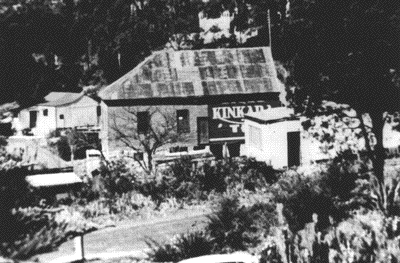
The Helensburgh and Lilyvale Co-operative Society was formed in 1892. It rented a small cottage in Walker Street. Shortly after, it transferred to larger premises on the corner of Stuart and Lilyvale Streets where it conducted a general business. The building was burnt out in 1906 and so the “Co-op”, as it was commonly called, rented George Simpson’s store in Walker Street. The store was later to become Pat Bragg’s General Store.
The Co-operative society established its own butchery and developed a slaughter yards on the Lower Coast Road at Blue Gum. It also developed a branch store in the defunct North Helensburgh Worker’s Club hall situated on The Crescent, up from Postman’s Track, in 1908 (Illustrated).
The Society later purchased Mr Simpson’s store in 1921, but following the death of “Darkie” Gill, the society purchased his shop on the corner of Walker and Short Streets and moved the business there. This building still stands, surrounded by the new BiLo development. The society also purchased Darkie Gill’s slaughter yard in Walker Street, near Knowsley Park, and so abandoned the Blue Gum yard. It is interesting to note that the cattle were delivered to Helensburgh by rail, unloaded at the Helensburgh siding, now the car park, and then driven by the butcher and his cattle dog, up Parkes Street and along Walker Street to the slaughter yard. The society bakery was situated on the rear lane of what is now the BiLo Supermarket. The building last did service as a Pinball Parlor.
In 1922 the manager, Mr. Booth, expanded the Co-op’s operation to include a furniture store, later to become John Watson’s Chemist, and also a shoe store which was later used for Helensburgh Electrics and the Nowarra Credit Union. When Mac’s Store vacated Harry Hansen’s shop, the Co-op transferred its delicatessen to that shop. All three shops were to close during the depression of the 1930s.
In 1943 the Co-op purchased Monty Ireland’s butchery in Parkes Street. The building was made of brick and built on the site of the Centennial Hall, opposite the Centennial Hotel. This site was later purchased by Cec Lumb in 1964. He demolished the butchery with the intention of developing a petrol station. It is now John Greenwood’s Smash Repairs.
In 1956 the society redeveloped its main premises on the corner of Walker and Short Streets at the cost of some £10,000. The business was turned into a self-serve grocery store.
When Bill Oliver returned as manager in 1952, the business was at its lowest ebb. The society owed some £20,000 to creditors including the Taxation Department and the Co-operative Wholesale Society. To assist the Society, the members’ share capital was raised from £7 to £14 and later £25. This liquidated its creditors, but didn’t help with the general slide the business was in.
In 1966 the society was forced into liquidation. The distribution to its 850 members was $2.50 per $2 (£1) share. The slide in business was brought about by locals travelling by car to the larger suburban centres to do their shopping. The new cash-n-carry supermarkets with their discount prices were a better option to the Society’s fortnightly credit plan.
The Helensburgh and Lilyvale Co-operative Society was a product of the socialist ethos that was firmly held in mining communities during the first half of the twentieth century. This communal philosophy stood the miners well during the miner’s strikes and the depression years. A decreasing sense of isolation and interdependence ended this rather interesting social experiment.
Co-operative Store Managers Messrs: Stranger, Jim Fenwick, McFarlane, Bob Sutcliffe, Tom Booth, Tom Burns, Tom Booth (again), Jim Watts, Bill Oliver, Alec Snedden, Alec Cullen, Welch and Bill Oliver (again).
Branch Managers Messrs. Bill MacMurray, Jack Robinson, Bob Sutcliffe, Charlie Carruthers, Dave Logan and Miss Marge Walton.
Presidents of the Society Messrs. Charlie Josland, Jack Standen, Charlie Bennett and Phil Leyshon.